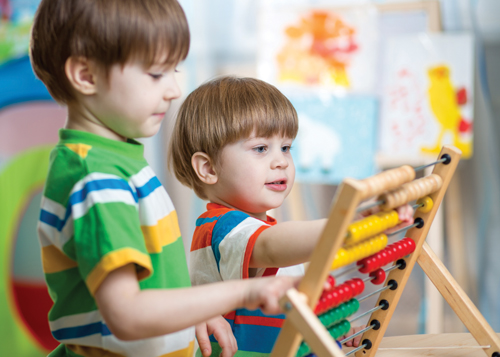
by Lucy Alexandra Spencer
Tutoring and Alternative Provision Director at Education Boutique,
part of the Eteach Group
When we incorporate maths into play, we create curious problem-solving thinkers who are ready to explore the world.
Incorporating maths into play is a well-evidenced catalyst for developing capable mathematicians, who are comfortable using maths skills in their everyday lives. The National Numeracy Organisation reports that half of the working-age adults in the UK have a numeracy level below the expected abilities for an 11 year old. It’s therefore vital that educators and parents work together to find ways to link maths to enjoyable everyday life events, in order for children to build a positive relationship with the subject and reduce the chance of developing maths-based anxieties and low self-esteem.
The Early Years Foundation Stage Framework sets the standard for providing early play-based maths experiences. It is supported by a report from the Education Endowment Foundation which found that play-based learning can be particularly effective at raising attainment in learners from disadvantaged backgrounds.
So, drawing on the evidence of the benefits, what can busy parents do to easily incorporate maths into play and everyday life routines?
Empowering every home to have a maths role model
By showing enthusiasm for maths and demonstrating resilience to problem-solving, parents can shape a child’s mindset for life. You don’t need to be ‘good’ at maths to be a positive role model. Even if you have had a rocky road with the subject yourself, now is a great time to draw a line in the sand and embrace the opportunities to form a collaborative partnership with your child. Together, you can help them to have fun and explore the wonderful world of numbers, shapes and statistics.
Don’t label the practise
Being ‘good’ at maths is so much more than buying your child every workbook on the internet or learning times tables. Don’t feel like you have to give maths at home a label, especially with younger children. What sounds more appealing to you – “Let’s do 20 minutes of maths” or “Let’s investigate the different quantities of ingredients needed to make the perfect banana smoothie?”
Learning through doing, will help a child develop many skills that link to a range of subjects, reaching much further than just the maths curriculum.
Utilising time efficiently
When your child has number facts or times tables to memorise, you can buy yourself some neon chalk pens and write the information on the bathroom mirror, for example. This means your child will be looking at and thinking about the content regularly, sometimes without being cognisant of the fact they are absorbing information. It’s an excellent routine to establish.
Additionally, creating a car journey routine where iPad maths apps, such as ‘Hit the Button’, ‘Prodigy Maths’ and others could be incorporated can work well. Don’t worry if your car journeys are device-free zones, play some of these great car journey maths games:
• Number plate maths
Make the largest or smallest number out of the numbers on passing registration plates.
• Guess the number
One player thinks of a number and the others in the car ask numeral questions to guess what it is.
• Number tennis
Choose a rule such as ‘add seven’ and go around the players in the car until someone gets out.
• Rule master
Count from one upwards and every time you get to a multiple of 10, create a new rule such as ‘clap instead of saying 10’.
Here are some of my other top tips for integrating maths into play:
• Cooking
The kitchen is a great place to incorporate numbers. Asking children questions such as: “How can we double this recipe?”, “What can we do if this ingredient is missing?” or “Can we cook it at double the heat for half the time?” are exciting ways for them to engage in maths.
• Shopping lists
Giving your child agency over shopping lists by using online supermarkets is another good way to incorporate maths. For example, you can challenge them to find where they can get items for the best price and ask them to organise the weekly shop while not exceeding a certain budget.
• Games
Gamifying maths is often talked about, but some of these may exist in your house already! Dust off Monopoly, a Lego set or try orienteering and geocaching on a sunny day.
• Collecting data
It can be helpful to consider how you can involve your child in collecting data. Family decisions such as holidays or meals can be a great opportunity to do this and for them to present their results.
• Sports
Dart boards can be an excellent resource to learn how to read the minute hand of the clock. Create a clock dart board and when you throw a dart read the minute hand value. How about quick mental calculations with three darts? The possibilities are endless!
• Music
The rhythm and beat of the music is an exciting way to incorporate counting. Games which involve counting in numbers in time to the beat of the music, for example, can work well, as well as counting how many times a certain word is repeated. Investigating speeding up and slowing down as well as recording audio messages may also capture your child’s interest.
Lucy supports children with emotional-based school non-attendance and helps families access LA funding, offering tutoring for children with additional needs. www.educationboutique.co.uk











